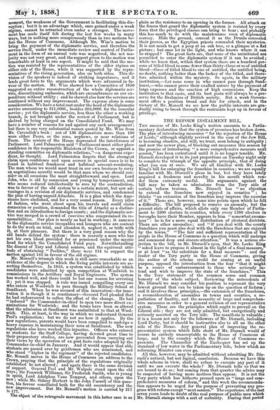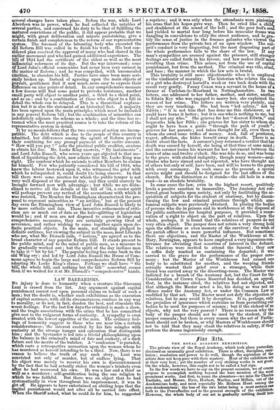THE REFORM INSTALMENT BILL.
THE success of Mr. Locke King's motion amounts to a Parlia- mentary declaration that the system of promises has broken down. The plan of introducing measures "for the rejection of the House of Lords," although slightly revived in the ease of the Jew Bill, is becoming obsolete, and will, we trust, soon belong to antiquity; and now the newer plan, of blocking out measures this session by the promise of introducing " a more comprehensive measure next session," has been caricatured until it is no longer tenable. Mx. Disraeli developed it to its just proportions on Tuesday night only to complete the triumph of the opposite principle, that of doing what you can at once. We are all familiar with Mr. Locke King's bill for enlarging the franchise in counties ; we are equally familiar with Mr. Disraeli's pleas in bar, but they have lately acquired a freshness and novelty in his mouth which ren- der them extremely useful. His arguments against the bill may be taken as admissions from the Tory side of All this, however, may be admitted without admitting Mr. Dis- raeli's natural, but not logical, conclusion. Because we have this whole scheme in view, shall we refuse to execute any part of it until we can execute the whole ? Mr. Disraeli tells us that we are bound to do so ; but coming from that quarter the advice may be suspected of having more motives than appear. It is not the Tory party which has hitherto pressed upon us "large and com- prehensive measures of reform,' and this week the recommenda- tion appears to be urged for the purpose of preventing any pro- gress with reform except" next session." The experience of the Jut seven years leads to doubt of the real purpose of public men which Mr. Disraeli stamps with a sort of certainty. During that period
several changes have taken plaoe. Before the war, while Lord Aberdeen was in power, when he had collected the notables of several parties and construed his duty to be that of fulfilling the matured convictions of the public, it did appear probable that we might, with great deliberation and minute painstaking, give a Certain finish and completeness to the reform of our representative witem. The foreman of the labouring body who executed the Old Reform Bill was called in to finish his work. His best con- ildered plan received the approval of many who had shared in the Oilier movement and who had gained additional experience. The bill of 1854 had the certificate of the oldest as well as the most iiifluential reformers of its day. But the war intervened; some Cf Lord John's official connexions had never been very earnest in the matter of Reform ; and he was compelled, with unconcealed emotion, to abandon his bill. Parties have since been more seri- ously broken up. Instead of agreeing upon the main objects of pursuit, gentlemen find it now much.more easy to express their difference on nice points of detail. In any comprehensive measure a few dozens will find some point to provoke resistance, another small party will object to another point, a third to a third point, and so on ; and by a combination of those who object to a bill in detail the whole can be delayed. This is a theoretical explana- tion but it is also the statement of an historical fact. A majority has been agreed upon the main principles which must be included in any general Reform bill ; but the combination of minorities can indefinitely adjourn the scheme as a whole ; and the time has re- turned when the most practical course is to take the reform of the tepresentative system in detail.
It by no means follows that the two courses of action are incom- patible. The debt which is due to the people of this country is admitted, but differences among the agents of Reform prevent their combining for any prompt payment of the entire amount. 41 How will you pay ? " asks the practical public creditor, anxious to obtain his due. Mr. Locke King answers, "By instalments" ; and Lord John Russell, who seven years ago objected- to that me- thod of liquidating the debt, now admits that Mr. Locke King was tight. The candour which he extends to other Members he claims for himself. Few who patiently considered his bill of 1854, who 'knew the labour bestowed upon it, who witnessed the grief with Which he relinquished it, could doubt his being sincere. In that bill there were some niceties for which the public temper is not very well disposed at the present day, and they could scarcely be brought forward now with advantage ; but while we are disin- clined to revive all the details of the bill of '54, a cooler spirit will perhaps prevent any revival of the accusations with which it was resisted. The Member for Birmingham characterized the pro- gralto represent minorities as "an artifice," but at the present yeven the Birmingham view of Lord John Russell is likely to be more catholic and fair. These inventive refinements of criti- cism are as much out of date as the hair-splitting of legislation Would be ; and if men are not disposed to concur in large and. Comprehensive measures,. they are certainly growing tired of severance, and rather wishing to conic together again upon de- finite practical objects. In the main not standing pledged to definite outlines but viewing the subject in the mass, most Liberals who are, what Mr. Disraeli calls, " serious " are agreed as to the broad character of any popular Reform Bill. It stands present to the public mind, and to the mind of public men, as a measure to be gradually worked out ; but the spirit of the day inclines men to take it" bit by bit." The popular feeling has come back to the old Whig cry; and led by Lord. John Russell the House of Com- mons agrees to begin the huge and comprehensive Reform Bill by adopting Mr. Locke King's clause. Perhaps we shall have "the till, the whole bill, and nothing but the bill" somewhat sooner than if we waited for it at Mr. Disraeli's "comprehensive" hands.



































 Previous page
Previous page